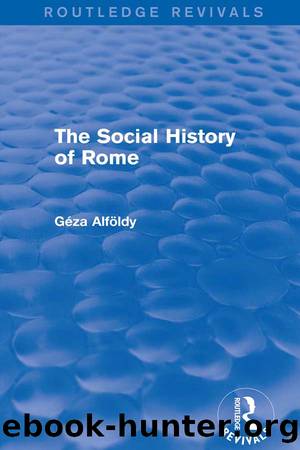The Social History of Rome (Routledge Revivals) by Dr Geza Alfoldy

Author:Dr Geza Alfoldy [Alfoldy, Geza]
Language: eng
Format: epub
Tags: History, Ancient, General, Rome, Social History
ISBN: 9781317668596
Google: FgDPBAAAQBAJ
Publisher: Routledge
Published: 2014-10-14T16:07:58+00:00
Lower Strata in the Cities
The social composition of the lower strata of the population in the Roman empire was even more heterogeneous than that of the upper strata. This was largely a corollary of the great economic, social and cultural diversity of the various parts of the empire. Indeed, this diversity also affected the leading strata in important ways, yet the members of the latter were for the most part brought together in organised orders and had their particular ranks therein marked out by uniform status symbols. A process of integration also occurred among the lower strata during the Empire, but â especially in rural areas â it could never proceed as far as in the higher echelons of Roman society. Thus at the turn of the first into the second century there were slight differences at most between the decurions of Italy, Africa and Pannonia, for example, in view of their numbers, wealth and level of education. But whereas the rural population of Italy still included many slaves, in Africa it already consisted of coloni to a significant extent and in Pannonia, by contrast, it was largely made up of independent peasants.
At the same time, the lower strata were not divided by hierarchical distinctions as clear as those among the upper strata. The only clear divisions were not horizontal, like those between senators, equites and decurions without equestrian rank, but vertical. First, there was the obvious division between the plebs urbana and the plebs rustica, founded upon their differences in place of habitation, occupation, economic activity, lifestyle, opportunities for advancement, culture, traditions and customs.151 This division was made all the more obvious by contrast with the structure of the upper strata, which had no division of this sort. The concepts of urbanitas and rusticitas immediately express the general view of the difference in the level of culture between the population of town and country. Strabo divided the population into city-dwellers and country-dwellers, with an intermediate category (13.1.25). Galen observed a great social gulf between the well-provided city-dwellers and the disadvantaged country-dwellers (6.749f.). Moreover, the different legal status of free-born, freedmen and slaves were also clearly defined. These differences had important social consequences, for the legal categories reflected different forms of dependency upon the upper strata among the lower strata. Yet the boundaries between all these groups were not obvious social divisions, despite the gradation from urbanus down to rusticus, ingenuus to liberties and thence to servus, a gradation of which there are many signs. It was not inclusion in one of the aforementioned categories that determined whether one possessed the means of production or not, whether one was prosperous or poor and whether one was partially or wholly dependent upon members of the upper strata. Rather, the latter factors were the basis of a pervasive internal stratification within each of the aforesaid groups, though this was always only a graduated stratification with no clear boundaries.
The lower strata in the cities tended to display more uniformity than the lower strata of rural areas.
Download
This site does not store any files on its server. We only index and link to content provided by other sites. Please contact the content providers to delete copyright contents if any and email us, we'll remove relevant links or contents immediately.
The Daily Stoic by Holiday Ryan & Hanselman Stephen(3287)
The Fate of Rome: Climate, Disease, and the End of an Empire (The Princeton History of the Ancient World) by Kyle Harper(3048)
People of the Earth: An Introduction to World Prehistory by Dr. Brian Fagan & Nadia Durrani(2719)
Ancient Worlds by Michael Scott(2663)
Babylon's Ark by Lawrence Anthony(2662)
The Daily Stoic by Ryan Holiday & Stephen Hanselman(2562)
Foreign Devils on the Silk Road: The Search for the Lost Treasures of Central Asia by Peter Hopkirk(2452)
India's Ancient Past by R.S. Sharma(2440)
MOSES THE EGYPTIAN by Jan Assmann(2407)
The Complete Dead Sea Scrolls in English (7th Edition) (Penguin Classics) by Geza Vermes(2269)
The Earth Chronicles Handbook by Zecharia Sitchin(2213)
Lost Technologies of Ancient Egypt by Christopher Dunn(2210)
24 Hours in Ancient Rome by Philip Matyszak(2072)
Alexander the Great by Philip Freeman(2054)
Aztec by Gary Jennings(2017)
The Nine Waves of Creation by Carl Johan Calleman(1903)
Curse Tablets and Binding Spells from the Ancient World by Gager John G.;(1857)
Before Atlantis by Frank Joseph(1845)
Earthmare: The Lost Book of Wars by Cergat(1814)
